

We have reached another milestone on our blog. Last week we reached 5000 hits on our site. (We have a hit counter on the lower left-hand side of the blog which indicates everytime someone visits our site. This has happened 5000 times since we started back in February 2008.) Also, we reached the one year anniversary of our pen pal program with the US Antarctic Program (USAP) last week on April, 26. John Miller of the USAP continues to write to our school from Antarctica; and we write to him.
Finally, today we have reached the next milestone -- post number 200. I have written 200 posts (or stories) for this blog since we started. Some of these posts have student writings and some have guest-written articles.Since this is a milestone, I have re-published here two posts -- one is the shortest post I have ever done for this blog and the other is the longest. The shortest is of our "Littlest Literacy AmeriCorps Volunteer," Gibson Fischer. The longest is of the "Socrates of Loyola University," Professor Fred Swaim.
It is fitting that these two people, who never had the chance to meet each other, should be side by side here because it is through this blog and Literacy AmeriCorps, SVDP-ALC, and Loyola that we discover by the oddest coincidence that they actually almost met each other (or had the chance to meet) ... and their relatives actually do know each other. This is one more strange coincidence I have encountered since Hurricane Katrina.
Here's how they are related: Gibson's mother, Sarah, is the program co-ordinator or director of Literacy AmeriCorps (LAC) New Orleans. It is through LAC that I am at SVDP-ALC teaching. Sarah's former Irish dance teacher, from years ago, is my sister MaryAnn McGrath Swaim. I played Irish music for Mary Ann's dance group. Mary Ann's husband is Fred Swaim, the "Socrates of Loyola." Fred passed six months after Hurricane Katrina from post-polio syndrome and contributing complications arising from evacuations from Katrina and later Hurricane Rita. Had he continued to teach at Loyola Law School (he taught Admiralty, Maritime Personal Injury, and Successions), he would have almost certainly met Sarah's husband, Owyn, who is finishing up his (Juris Doctor) law degree at Loyola now. Mary Ann and I also graduated from Loyola Law some years ago. And Sarah's office is at Loyola.
So, oddly enough, these two people -- Gibson and Fred -- have met, but only on this blog -- even though their families knew each other but did not realize it until I came to Literacy AmeriCorps and SVDP-ALC two years ago and created this blog.
So, if you are a follower of this blog, please take a look at these two stories below one more time with this new, coincidental perspective in mind.
I am re-printing the articles exactly as they appeared before -- our shortest story and our longest story.
It is a small post-Katrina world.
--Adrian
Thursday, April 9, 2009
Literacy AmeriCorps New Orleans Goes to Pittsburgh
Gibson
0 commentsFriday, September 19, 2008
Remember Katrina: Fred Swaim, The Socrates of Loyola University

(Below is another in our SVDP-ALC blog series on "Remember: Hurricane Katrina." As you recall this series was interrupted by the appearance of Hurricane Gustav near August 29th this year, Katrina's anniversary, and then again by Hurricane Ike. We will, however, continue with more Katrina stories and more Katrina people until our story is told.
-- Adrian)
"For sudden the worst turns the best to the brave."
From Prospice by Robert Browning
It was Ernest Shackleton who was fond of this quote (above) from Browning's poem about death and life and courage -- Prospice (pronounced from the Latin as pro-spee'--kay, meaning looking forward). Shackleton was a man who should feel right at home on this blog. He was the Anglo-Irish Antarctic explorer who tried to cross the frozen continent via the South Pole. He became shipwrecked with his crew when his famous ship, "The Endurance", got stuck in the ice at the Weddell Sea. "The Endurance" was finally crushed and sunk in the shifting ice of Antarctica. Shackleton, however, did not desert his crew or give up hope. He abandoned his original goal of being the first to transverse Antarctica via the Pole for a much higher purpose: to save the very lives of his crew and himself. He used Browning's poem and that very line (above) to inspire his crew and keep them alive. The "worst" situation had fallen to them. But "the best" would occur suddenly as they shifted their goals in life from vainglorious glory to sheer survival and self-sacrifice to save their own lives and the lives of each other in the crew. Shackleton did eventually save every man in his crew in an incredible adventure -- by sailing in nearly frozen seas with some of his crew in a wooden life boat to get help and return for the rest of his crew.
This amazing story of Antarctica, among other things, inspired me to begin our school's pen pal program with the the U.S. Antarctic Program (USAP). In addition to geography lessons and other studies for basic education, Antarctica teaches us about struggle, death, and life.
But to us who read this blog, Antarctica is also linked now --oddly enough --to New Orleans and thus to Hurricane Katrina. In an unpredictable and seemingly impossible way, a set of characters have crossed paths right here on our blog. Shackleton's struggle -- and the very name of his ship "The Endurance" -- is relevant to our story of Katrina. We have seen on our blog other Katrina people -- the students from the St. Vincent de Paul - ALC school and their pen pals who are members of the USAP stationed at McMurdo and the Amundsen-Scott South Pole Station. You, dear reader, have read about Miss Kitty, the post-Katrina cat, who was a good friend of mine during my own Katrina "displacement. (See the post on Aug. 2nd.) You read about hurricanes and rumors of hurricanes besides Katrina like Hurricane Rita and Hurricane Gustav which drove all the citizens of New Orleans into evacuation, once again, from their wounded and vulnerable city. And you read about Hurricane Ike which just missed us last week and hit Houston instead and destroyed much of Galveston.
Now you will meet another Katrina person -- who was (and still is in spirit) the most outrageous of them all. (See his photo above.) He was a lawyer, but he did not act like a lawyer. He was a law professor, but he did not act like a law professor. He was the author of a book on law, but he did not act like the author of a book on law. He had a law degree from Tulane and a masters degree in law from U.C. Berkeley, but he certainly did not act like he was from Berkeley. (He went to De la Salle too and spent his youth in MidCity, a true New Orleanian.)
How did he act, you may ask? Well, he took Shakespeare's advice: All the world was his stage. He acted like he was Jimmy Cagney. He acted like he was Marlon Brando in "The Wild Bunch" (Question: "What are you rebelling against?" Answer: "What have you got?") He acted like Peter Falk in Columbo, a program he once watched religiously. He rode a motorcycle at one point while teaching law at Loyola Law School in New Orleans despite the fact that he suffered most of his life from polio.
He had a fast wit and would take jabs at people, but it was just in fun. He once ran --or attempted to run -- an ill-fated campaign for governor of Louisiana. After watching countless re-runs of "Raiders of the Lost Ark," he came to believe that he was Indiana Jones. But as evidence that he was not totally delusional, he quite sanely called himself instead merely "Louisiana Swaim."
"Louisiana Swaim for Governor!" Yes, I can still recall the rallying cry. Alas, that was the campaigm that never materialized, although his law students were ready to carry on with the campaign. He taught law at Loyola Law School for about 30 years, from the early 1970's until the hedious days of Hurricane Katrina.
Despite his deteriorating health -- again due to post-polio syndrome-- he tried to continue to teach. He never claimed to be like Socrates -- that was not one of his Walter Mitty roles on his stage of life. But, yes, I think he was like Socrates. (The wise man knows how much he does not know and challenges those who think they know everything.) While your basic Corporations or Real Estate Law professor would be aghast to show up in class wearing the wrong color tie or an inappropriate business suit, Fred -- I mean Louisiana Swaim-- would wear a Hawaiian Luau shirt. He might show up in winter time wearing his motorcycle jacket, who knows? (Again... Q: "What are you rebelling against? A: What have you got.)
But it was not all craziness. No. Mainly I remember the books. Lots and lots and lots of books. He had accumulated, well, it must have been in the thousands. He read all the time. And not just things that he taught like law, which, of course, he read. But subjects of every type, it seemed. Books on philosophy. Books on drama and movies and psychology. Books on history, especially on World War 2. Books on science fiction. (We, of course, ofter discussed the "truth" behind the Roswell Incident, you know, where the flying saucers crashed landed in New Mexico in 1947? Yep, he knew "the truth" about UFOs too.) He read books about the Kennedy Assassination and even got an autographed copy of Jim Garrison's book on the subject -- which he subsequently gave to me.
Fred had one wife and three children, one sister, and parents who pasted away many years ago. (I remember Fred's father once told me that he, the father, once sat on the Outlaw Jessee James' knee once when he was a child. I wonder if that was true?) Fred had acquired polio in the 1950's in New Orleans during what was a period of epidemic. But instead of letting this destroy himself, he found other goals in life. So, rather than crossing Antarctica via the South Pole (or the New Orleans equivalent of this), he concentrated on saving the only life he had and the equivalent of the lives of his crew, which were the people who came into his life, his family, his friends, and his students -- or at least helping them as best he could. And throughtout his life he continued to read. Lots and lots and lots of books.
I still recall seeing his room at his parents' house many years ago. He had his large bookshelf right next to his bed where he could reach books right off the shelf from a proper lying/reading position. I realized then this was a brilliant idea, and I have always tried to duplicate this in my life (although in post-Katrina living it has been a challenge.)
He liked boiled crabs, New Orleans seafood, beer, and above all my sister's homecooking. (My sister Mary Ann and Fred were married more than 30 years ago at Holy Name Church at Loyola University).
He was at one point my Admiralty professor. He was my-brother-in-law. And he was my friend.
The Hell that was Hurricane Katrina -- the nightmare that was the evacuation from both that storm and also Hurricane Rita -- eventually was too much. (He and my sister had to evacuate twice -- from New Orleans to Lafayette for Katrina, then from Lafayette to Mississippi to stay at the home of the parents of my brother-in-law Chris. (Chris had helped our family multiple times during and since Katrina. He also has helped our SVDP-ALC school on many occasions behind the scenes. It was Chris and Marci, my sister, who "owned" Miss Kitty by the way, the Katrina Cat who is mentioned in another Katrina story on this blog. See Aug. 2nd post.)
It is very difficult to remember those days of Hurricane Katrina without breaking down. What words can we use to describe the whole ordeal? Nightmare? Horror? Unbelievable? I just don't know anymore. You tell me.
Fred -- his real name was Frederick, by the way, but I never called him that-- passed several months after my mother passed who also went through Hurricane Katrina. He did not go without a fight, however. He once loved to follow boxing, and even punched a punching bag as a youth -- despite having polio... or maybe because of it?
People might not always be able to overcome the insurmountable, but some people still try. I recall my sister Mary Ann discussing how they watched and enjoyed a film about FDR with Kenneth Branagh, the Irish actor who also played -- oddly enough-- Ernest Shackleton in a biographical film. Franklin D. Roosevelt, of course, was stricken with polio. We who do not have that illness, or a similar sickness, cannot really understand what it does to people both physically and psychologically. But it is amazing what some people can accomplish despite these afflictions.
Fred, who was once an English literature major, was fond of the poems of Dylan Thomas. I will not tell you when it was the last time Fred heard this poem read out loud; but I will tell you that it was after Hurricane Katrina, and it had a special importance.
So, I will repeat that poem below. Please read it. Perhaps it will have a special meaning for your own life or the life of a loved one some day.
"Do Not Go Gentle Into That Good Night"
By Dylan Thomas
Do not go gentle into that good night
Old age should burn and rave at close of day;
Rage, rage against the dying of the light.
Though wise men at their end know dark is right,
Because their words had forked no lightning
they do not go gentle into that good night.
Good men, the last wave by, crying how bright
Their frail deeds might have danced in a green bay
Rage, rage against the dying of the light.
Wild men who caught and sang the sun in flight
And learn, too late, they grieved it on its way
Do not go gentle into that good night.
Grave men, near death, who see with blinding sight
Blind eyes could blaze like meteors and be gay
Rage, rage against the dying of the light.
And you, my father, there on the sad height
Curse, bless me now with your fierce tears, I pray.
Do not go gentle into that good night.
Rage, rage against the dying of the light.
Fred did not go gentle into the night.
He was still outrageous and courageous to the end.
The worst turned the best to the brave.
And we will all meet again.
-- Adrian

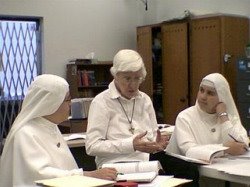
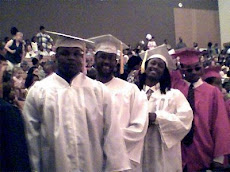
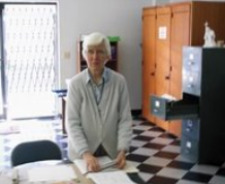


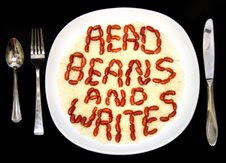
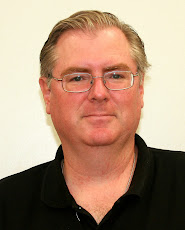


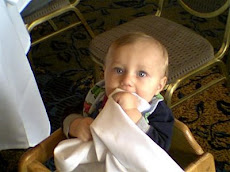
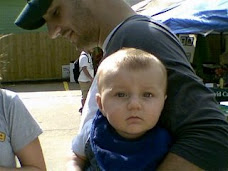



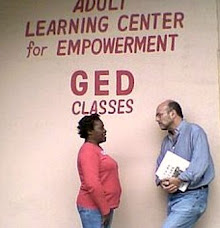

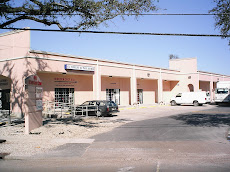


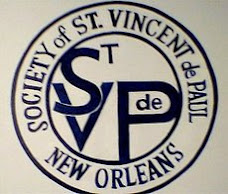
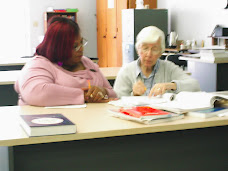
No comments:
Post a Comment